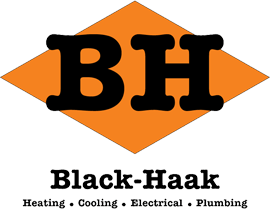
Warm air is able to hold more water vapor than cold air, and hence, cold air feels drier. Like many households in the winter, you may have experienced doorknobs that shock, dry skin, respiratory irritation and even headaches. There is a common misconception that heating your home dries it out. Dry air in the home is actually a byproduct of heating your home and not a direct result. The outside air is drier and continuously drawn into the home to heat it, which reduces the relative humidity (RH). A humidifier will prevent this effect, and a whole-house system can help maintain an optimal RH throughout your home.
Health Benefits of Humidification
The health benefits are among the best reasons to invest in a humidifier. Adding moisture to your air makes it easier to breathe and makes you much less prone to irritation of the eyes, nose, mouth, throat and lungs. Such irritation can exacerbate allergy and asthma symptoms, but even for people with otherwise healthy respiratory systems, it can lead to fatigue, headaches, dizziness and more. Because of dehydration of the respiratory system, dry air can also make you more prone to colds and even bronchitis.
More moisture in the air will make your hair look and feel better, and it will make your family more comfortable. It will also reduce the amount of static electricity in the home, which is not only a nuisance but can damage electronics in certain scenarios.
Protecting Your Home With Humidification
Low humidity in a home has a bigger effect than just on how you feel. Over time, it can cause the natural wood in your home to crack and even warp and can damage the finish. Such damage is particularly concerning when it comes to hardwood floors but also wood furniture, pianos, pool tables and so on. The National Wood Floor Association recommends a normal RH level of 30%-50%, and this coincides with the EPA recommendation of 30%-50% for optimal human health and to help avoid pests. Maintaining an optimal RH also helps protect many other possessions that you keep in your home, such as electronics, wine, wallpaper, important documents, photographs, paintings and books.
Whole-house Humidification Versus Portable Humidifiers
Perhaps the most accessible way to humidify your home is with a portable humidifier, and what makes this option attractive is that you can just pick it up and bring it with you into whichever room you are using. But there are a number of downsides to portable units. While the initial investment seems low, portable units will tend to cost you more over the life of a whole-house system. In addition, portable units only work in a small area and may not provide the protection you need for your hardwood floors and the like, and they are much more prone to adding too much moisture and reducing indoor air quality. Portable units also require much more day-to-day maintenance. The maintenance your whole-house system needs can be done once a year when you schedule your seasonal heating tune-up.
Up-front and Long-term Costs
Another consideration in determining whether you need a whole-house dehumidifier is the initial cost and the total cost of ownership. The factors that will contribute to your initial cost include the size of the home and, thus, the size of the unit, installation costs, the particular humidifier technology and whether you opt for an economy, mid-range or high-end model. Total costs for such a project can range from as low as $200 to as high as $2,000, which is a significant investment. There are also the month-to-month costs to consider, and the typical estimate is about $15 a month in electricity. Maintenance costs are generally just a nominal increase to your seasonal heating tune-up expense.
Energy Efficiency and Long-term Savings
A whole-home humidifier can save you money. It allows you to keep your home at a lower temperature and still feel comfortable. For the average homeowner who invests in a whole-home humidifier, this results in a 4% savings, which helps to offset the $15 cost to run the humidifier. Something else to consider is that your heating system does not have to work as hard or as much. That means reduced maintenance and repair costs, and while those savings are more difficult to estimate, most industry experts agree that a whole-home humidifier will pay for itself over the life of the equipment.
Steam, Drum and Flow-through Humidifiers
There are three core types of whole-home humidifiers available: steam, drum and bypass. Steam humidifiers are widely considered the best because they are the most cost-efficient and energy-efficient and will likely save you the most money over the long term. On the other hand, steam units tend to be the most expensive up front and may be overkill if your climate is not particularly dry.
Drum humidifiers use evaporation to add moisture to your air. These systems are generally installed in the ductwork. They have a reservoir in addition to a revolving drum and water panel that are used to soak up the moisture. When the air moves through, water from the panel is evaporated into it. Drum humidifiers are the most inexpensive when it comes to the initial investment, but there is the potential downside that water in the reservoir can become stagnant and a breeding ground for bacteria.
Flow-through humidifiers also use evaporation but do not have moving parts or even require electricity. Water dampens a water panel and is then evaporated into the hot air as it passes through. Flow-through models cost a bit more than drum humidifiers but cost nothing to run and require little maintenance.
Can a Whole-house Humidifier Cause Mold?
A common concern among homeowners considering a whole-house humidifier is that it can cause mold. Adding moisture to your indoor environment certainly increases the chances for mold, but it is not accurate to say that whole-house humidifiers cause mold. Most experts recommend investing in a smart thermostat and an automatic humidification system that will adjust the moisture based on the relative humidity set via the thermostat. It is also important to schedule routine maintenance each year through which your heating, humidifier, ventilation and thermostat are inspected, cleaned and calibrated. When mold is a problem, it is generally because the system was used improperly or humidification exacerbated moisture from another source.
Your Fox Valley Humidification Pros
Black-Haak has been serving communities throughout the Fox Valley since 1956. Our company installs, services, and repairs humidifiers, dehumidifiers and other indoor air quality equipment, and we do the same for all manner of home heating and cooling equipment. We also have plumbers who handle everything from fixing leaky faucets to main sewer line services, and our electricians can handle everything from upgrading you to GCFI outlets to installing a whole-home generator or EV charging station. If you would like to schedule service or a consultation, call Black-Haak today or contact us online.

